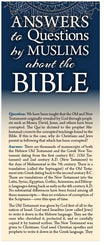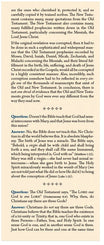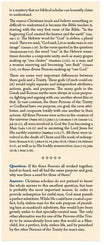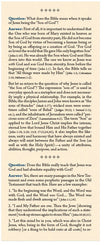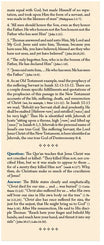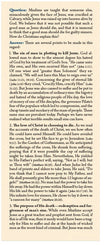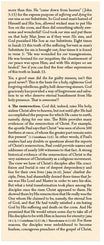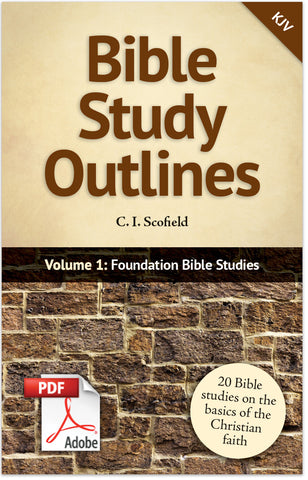Answers To Questions By Muslims About The Bible
- Estimated shipping date: Today (Click for more details)
- SKU:
- Format: Booklet
- Size: 3.5 inches x 8.5 inches
- Pages: 8
- Version: KJV
Show all item details
Question: We have been taught that the Old and New Testaments originally revealed by God through prophets such as Moses, David, Jesus, and others have been corrupted. The Qur’an dictated to the prophet Muhammad corrects the corrupted teachings found in the Bible. If this is the case, why do Christians and Jews persist in following that which has been corrupted?
Answer: There are thousands of manuscripts of both the Hebrew Old Testament and the Greek New Testament dating from the first century B.C. (Old Testament) and 2nd century A.D. (New Testament) to the days of Muhammad in the 7th century. There is a translation (called the Septuagint) of the Old Testament into Greek dating back to the second century B.C. There are translations of the New Testament into the Latin, Syriac, Egyptian, Gothic, Armenian, and Ethiopic languages dating back as early as the 4th century A.D. No substantial differences have been found among all these manuscripts— thus no evidence of corruption of the Scriptures—over this span of time.
The Old Testament was given by God first of all to the nation of Israel. God used Israelites (now called Jews) to write it down in the Hebrew language. They are the ones who cherished it, protected it, and so carefully copied it by trained scribes. The New Testament was given to Christians. God used Christian apostles and prophets to write it down in the Greek language. They are the ones who cherished it, protected it, and so carefully copied it by trained scribes. The New Testament contains many, many quotations from the Old Testament. The New Testament also contains many, many fulfilled prophecies written down in the Old Testament, particularly concerning the Messiah, the Lord Jesus Christ.
If the original revelation was corrupted, then it had to be done in such a sophisticated and widespread manner that the Old Testament prophesies recorded by Moses, David, Isaiah, Daniel, Micah, Zechariah, and Malachi concerning the Messiah, and their literal fulfillment in the birth, life, suffering, and death of Jesus Christ recorded in the Gospels, would all be corrupted in a highly consistent manner. Also, incredibly, such corruption somehow had to be reflected in every single one of the thousands of manuscripts that exist of the Old and New Testament. In conclusion, there is not one shred of evidence that the Old and New Testaments given by God were ever any different from the way they read now.
Question: Doesn’t the Bible teach that God had sexual intercourse with Mary, and that Jesus was born from this union?
Answer: No, the Bible does not teach this. No Christian in all the world believes this. It is absolute blasphemy. The birth of Jesus was a miracle. The Bible says, “Behold, a virgin shall be with child and shall bring forth a son, and they shall call His name Immanuel, which being interpreted is, God with us” (Matthew 1:23). Mary was still a virgin—she had never had sexual intercourse—when she gave birth to Jesus. The Holy Spirit miraculously worked in the womb of Mary (we are not told just what He did or how He did it) to bring about the conception of Jesus (Luke 1:35).
Question: The Old Testament says, “The Lord our God is one Lord” (Deuteronomy 6:4). Why, then, do Christians say there are three Gods?
Answer: Christians do not say there are three Gods. Christians believe that the Bible teaches the existence of a tri-unity or Trinity, that is, one God who exists in three Persons—Father, Son, and Holy Spirit. In one sense God is one, and in another sense God is three. Just how God can be three and one at the same time is a mystery that no biblical scholar can honestly claim to understand.
The reason Christians teach and believe something so difficult to understand is because the Bible teaches it, starting with the very first verse of the Bible: “In the beginning God created the heaven and the earth” (Genesis 1:1). The Hebrew word for “God” is elohim, a plural word. Then we read, “God said, Let us make man in our image” (Genesis 1:26). In the verse quoted in the question (Deuteronomy 6:4), the word “one” in the Hebrew sometimes denotes a composite unity, such as many grapes making up “one cluster” (Numbers 13:23), or a man and a woman marrying and becoming “one flesh” (Genesis 2:24), or three divine Persons making up “one God.”
There are some very important differences between three gods and a Trinity. Three gods (if such could exist) would imply separate and independent attributes, actions, goals, and purposes. The many gods in the Greek and Roman myths were always at cross purposes, fighting and arguing with one another about this or that. In vast contrast, the three Persons of the Trinity or Godhead have one purpose, one goal, the same attributes, and cooperate totally with one another in their actions. All three Persons were active in the creation of the universe (Psalm 102:23; John 1:3; Colossians 1:16; Genesis 1:2; Job 26:13), all were involved in God the Son becoming a Man (Luke 1:26-35) and in anointing the Lord Jesus for His earthly ministry (Matthew 3:16,17). All three were involved in the death of Christ and His work of redemption (Romans 8:32; 1 John 4:10, 14; John 10:18; 1 Peter 2:24; Hebrews 9:14), as well as in His bodily resurrection (Acts 2:24; John 10:18; 1 Peter 3:18).
Question: If the three Persons all worked together, hand-in-hand, and all had the same purpose and goal, why was there a need for three of them?
Answer: Christian scholars do not pretend to know the whole answer to this excellent question, but here is probably the most important reason: In order to provide redemption for sinful man, God must punish a perfect substitute. While He could have created a perfect, holy, sinless man for the sole purpose of punishing him as mankind’s substitute, this would have been grossly unfair to that specially-created man. The only other alternative was for one of the Persons of the Trinity to be miraculously born into this world as a Man-child, live a perfect, holy, sinless life, and be punished by the other Persons of the Trinity for man’s sins.
Question: What does the Bible mean when it speaks of Jesus being the “Son of God”?
Answer: First of all, it is important to understand that the One who was born of Mary existed in heaven as the Son of God from eternity past; He did not become Son of God by virtue of becoming a human being or by being an offspring or a creation of God. “For God so loved the world that He gave His only begotten Son” (John 3:16). He was already the Son when God sent Him down into this world. The one we know as Jesus was with God and was God from eternity, from before the beginning of time (John 1:1). In fact, the Bible tells us that “All things were made by Him” (John 1:3; Colossians 1:16; Hebrews 1:2).
But let us return to the question of why Jesus is called “the Son of God”? The expression “son of” is used in everyday speech as a metaphor and does not necessarily imply a physical relationship. For example, in the Bible, the disciples James and John were known as “the sons of thunder” (Mark 3:17); wicked men were sometimes called “sons of Belial” (Judges 19:22; 1 Samuel 2:12; etc.); and the inhabitants of Jerusalem were called “precious sons of Zion” (Lamentations 4:2). The term “Son” as applied to the Lord Jesus Christ implies the intense, eternal love that bound Him and His Father together (John 1:18; 5:20; 15:9; 17:23,24,26); it also implies the likeness, unity and harmony that have always existed and always will exist between the Father and the Son (as well as with the Holy Spirit)—a unity of attributes, abilities, thought, purpose, and action.
Question: Does the Bible really teach that Jesus was God and had absolute equality with God?
Answer: Yes, there are many passages in the New Testament and even some prophetic passages in the Old Testament that teach this. Here are a few examples:
1. “In the beginning was the Word, and the Word was with God, and the Word was God.... The Word was made flesh and dwelt among us” (John 1:1,14).
2. “I and My Father are one. Then the Jews [showing that they understood the implications of such a statement] took up stones again to stone Him” (John 10:30,31).
3. “Let this mind be in you, which was also in Christ Jesus, who, being in the form of God, thought it not robbery [or a thing to be held onto at all costs] to remain equal with God, but made Himself of no reputation, and took upon Him the form of a servant, and was made in the likeness of men” (Philippians 2:5-7).
4. “All men should honor the Son, even as they honor the Father. He who honors not the Son honors not the Father who has sent Him” (John 5:23).
5. “Thomas answered and said unto Him, My Lord and My God. Jesus said unto him, Thomas, because you have seen Me, you have believed; blessed are they who have not seen, and yet have believed” (John 20:28,29).
6. “The only begotten Son, who is in the bosom of the Father, He has declared Him” (John 1:18).
7. “Jesus said unto him, ... He who has seen Me has seen the Father” (John 14:9).
8. As an Old Testament example, read the prophecy of the suffering Servant in Isaiah 52:13-53:12. There are a couple dozen specific fulfillments and quotations of the prophecies of this passage in the New Testament accounts of the life, suffering, death, and resurrection of Christ (see, for example, 1 Peter 2:21-25). In Isaiah 52:13 we read, “Behold my Servant shall deal prudently, He shall be exalted [Hebrew rum] and extolled [nasa] and be very high.” Thus He is identified with Jehovah of hosts “sitting upon a throne, high [rum] and lifted up [nasa]” in Isaiah 6:1,3. Jehovah is the personal name of Israel’s one true God. The suffering Servant, the Lord Jesus Christ of the New Testament, is here identified as Jehovah, the one true God of Deuteronomy 6:4.
Question: The Qur’an teaches that Jesus Christ was not crucified or killed: “They killed Him not, nor crucified Him, but so it was made to appear to them ... for of a surety they killed Him not” (surah 4:157). Why, then, do Christians make so much of the crucifixion of Jesus?
Answer: The Bible states clearly and emphatically, “Christ died for our sins ... and ... was buried” (1 Corinthians 15:3,4). “Christ also suffered for us ... who His own self bore our sins in His own body on the tree” (1 Peter 2:21,24). “Christ also has once suffered for sins, the just for the unjust, that He might bring us to God” (1 Peter 3:18). After His resurrection, He said to His disciple Thomas: “Reach here your finger and behold My hands; and reach here your hand, and thrust it into my side” (John 20:27; Luke 24:39).
Question: Muslims are taught that someone else, miraculously given the face of Jesus, was crucified at Calvary, while Jesus was raised up into heaven alive by God. We believe that it was not possible that such a good man as Jesus should die, and that it is immoral to think that a good man should die for guilty sinners. How do Christians explain this?
Answer: There are several points to be made in this regard:
l. The sin of men in plotting to kill Jesus. God allowed man to show to the utmost degree his hatred of God by his treatment of God’s Son. “He came unto His own, and His own received Him not” (John 1:11). Of one wiser and “greater than Solomon” they exclaimed, “We will not have this Man to reign over us” (Luke 11:31; 19:14). Concerning the giver of eternal life (John 3:16) they cried, “Crucify Him, crucify Him” (Luke 21:23). But Jesus was also caused to suffer and be put to death by an accumulation of ordinary sins: the bigotry and hatred of the religious people of His day, the love of money of one of His disciples, the governor Pilate’s fear of the populace which led to compromise, and the cheap taunts and mockery of the mass of people. These same sins are prevalent today. Perhaps we have never realized what terrible results small sins can have.
2. The love of Christ in choosing to die. As we read the accounts of the death of Christ, we see how often He could have saved Himself. He could have avoided the cross, but he set His face to go to Jerusalem (Luke 9:51). In the Garden of Gethsemane, as He anticipated the sufferings of the cross, He shrank from suffering, praying that if it were possible the cup of suffering might be taken from Him. Nevertheless, He yielded to His Father’s perfect will, saying, “Not as I will, but as Thou wilt” (Matthew 26:39). And when Judas led the band of priests and elders to take Jesus, He said, “Do you think that I cannot now pray to My Father, and He shall presently give Me more than 12 legions of angels?” (Matthew 26:53). No man had the power to take his life away. He had the power within Himself to lay down His life and the power to take it again (John 10:17,18). In His infinite love for sinners, He chose to lay it down as “a ransom for many” (Matthew 20:28).
3. The purpose of His death—redemption and forgiveness of man’s sins. While even Muslims accept Jesus as a great teacher and prophet sent from God, if this is all He was, then it surely would have been a tragedy for Him to suffer and die at the hands of wicked men as the worst kind of criminal. But Jesus was much more than this. He “came down from heaven” (John 3:13) for the express purpose of suffering and dying for our sins as our Substitute. So God used man’s hatred of Himself and His Son, allowed wicked man to put His Son on the cross, and then did something utterly awesome and wonderful! God took our sins and put them on that holy Man Jesus as if they were His sins, and God punished His Son as our Substitute. Eight times in Isaiah 53 this truth of the suffering Servant as man’s Substitute for sin is brought out; four times it is found in verse 5: “He was wounded for our transgressions, He was bruised for our iniquities; the chastisement of our peace was upon Him; and with His stripes we are healed.” See if you can find the four other expressions of this truth in Isaiah 53.
Yes, a good man did die for guilty sinners; isn’t this good news!! This is the basis for a holy, righteous God forgiving rebellious, guilty, hell-deserving sinners. God graciously has provided a way of forgiveness and salvation to us who deserve eternal banishment from His holy presence. That is awesome!!
4. The resurrection. God did, indeed, raise His holy, sinless Christ alive to heaven, but not until after He had accomplished the purpose for which He came to earth, namely, dying for our sins. The Bible provides many evidences of the resurrection of Christ. For example, the apostle Paul says that Christ “was seen of above 500 brethren at once, of whom the greater part remain unto this present” (1 Corinthians 15:6). In other words, if Paul’s readers had any doubts or questions about the reports of Christ’s resurrection, Paul could provide names and addresses of nearly 500 witnesses to that fact. A strong historical evidence of the resurrection of Christ is the very existence of Christianity as a religious movement. The view we have of Christ’s disciples after His crucifixion and burial is one of deepest despondency and fear for their own lives (John 20:19). Jesus’ chiefest disciple, Peter, had shamefully denied three times that Jesus was His Lord and Master in order to save his skin. But what a total transformation took place among the disciples once the risen Christ appeared to them. He showed them by His resurrection that He really was the One whom He claimed to be, namely, the eternal Son of God, and that He had totally satisfied a sin-hating God by His suffering and death on the cross. And He promised that He would return some day to take all of His disciples to be with Him in heaven for eternity (John 14:1-3; 1 Corinthians 15:51-58; 1 Thessalonians 4:13-18). For these reasons, the disciples were emboldened to become fearless, courageous preachers of the gospel of Christ, in spite of both the threat and the reality of imprisonment and death (read the entire book of the Acts of the Apostles).
Nearly all the religious systems of the world teach that man must try his very best to please a holy God and to do more good works than bad ones in order to be assured of a place in heaven. In Christianity alone is found the teaching (through the Bible) that God is so high and so holy that man could never do enough good works to overcome his sins and to deserve eternal life. And in Christianity alone is it taught that the high and holy God loves sinful man so much that He gave His only Son to die for man’s sins and thus provide redemption, forgiveness, and eternal life for those who are spiritually “dead in trespasses and sins” (Ephesians 2:1). Will you, my dear friend, humble yourself before the high and holy God, acknowledge that you are a rebellious, bankrupt, spiritually dead sinner, and place your trust in the crucified and risen Christ alone for your eternal salvation?
“All have sinned, and come short of the glory of God” (Romans 3:23).
“The wages of sin is death; but the gift of God is eternal life through Jesus Christ our Lord” (Romans 6:23).
“By grace are you saved through faith; and that not of yourselves: it is the gift of God; not of works, lest any man should boast” (Ephesians 2:8,9).
“He who believes on the Son has everlasting life; and he who believes not the Son shall not see life; but the wrath of God abides on Him” (John 3:36).
“Whosoever was not found written in the book of life was cast into the lake of fire” (Revelation 20:15).


